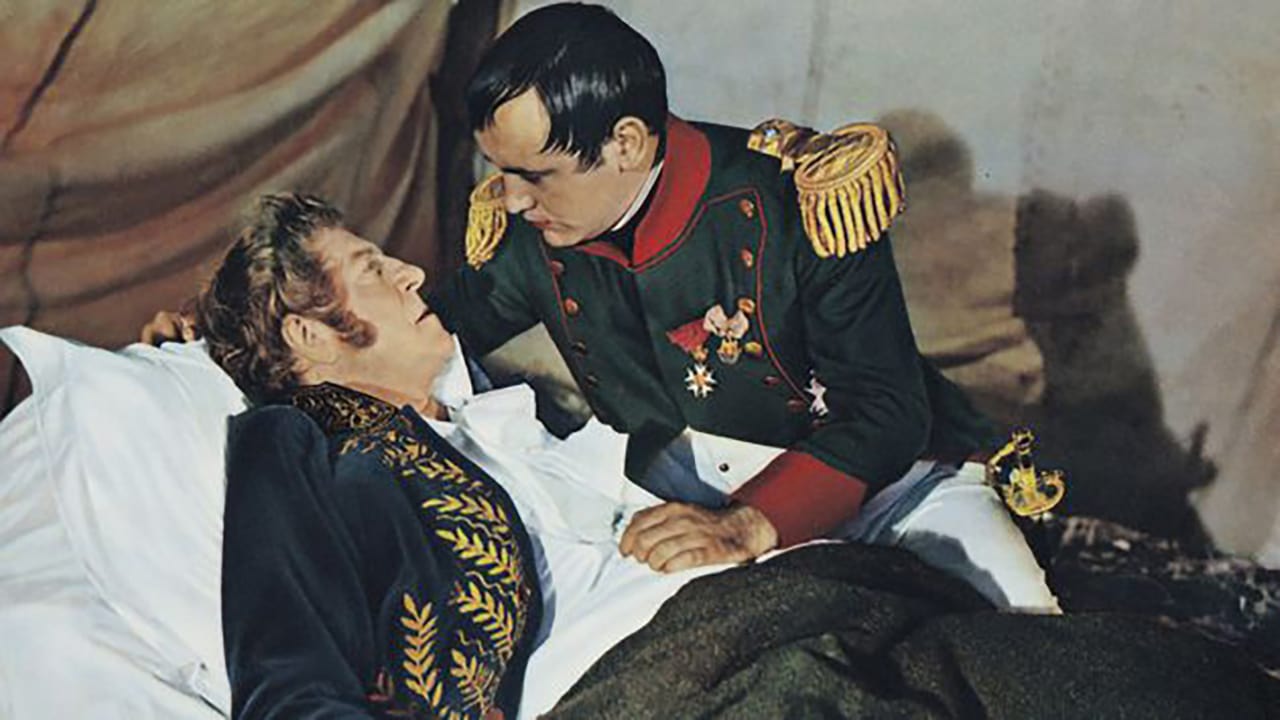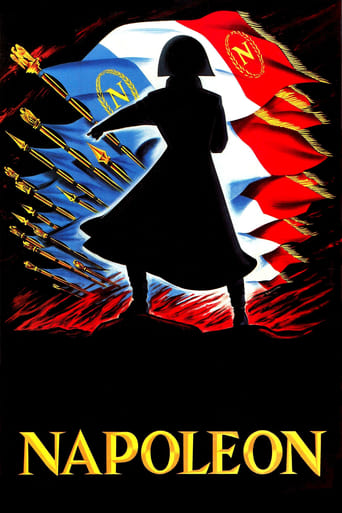

Great visuals, story delivers no surprises
... View MoreDisappointment for a huge fan!
... View MoreIt is neither dumb nor smart enough to be fun, and spends way too much time with its boring human characters.
... View MoreIt really made me laugh, but for some moments I was tearing up because I could relate so much.
... View MoreI was surprised to see that this historical film was made by Sacha Guitry—an auteur known for his comedies. This film is no comedy, but more like a slobbery film that portrays Napoleon as a wonderful guy! Now the fact that it the film liked this evil sociopath isn't completely surprising, as it was made by the French. But why was this film about such an important historical figure so dull?! Instead of telling the story in a conventional way, it's told through flashbacks—and comes off more like a documentary than a bio-pic. In other words, we see little snippets and they often are narrated. Why not just let the story tell itself? Why the device of having an old soldier reminiscing about his beloved Emperor? It's really a shame, as the film is at times quite grand. It was filmed at the various palaces occupied by Napoleon. And, its battle sequences are very good---though the insanely big and expensive Russian version of "War and Peace" sure has "Napoleon" beat by a wide margin in this regard. Overall, it's a very beautiful but dull film—one that certainly should have been more exciting and interesting. Some more energy and emotion sure would have helped! By the way, occasionally the film minimized or ignored Napoleon's failures. For example, there is no mention that his Egyptian campaign was a total failure. Also, they TOLD that Napoleon's retreat from Moscow went badly—but didn't show it or really talk about it! As I said, the film sure seemed very pro-Napoleon and never talked about all the people killed by him nor the countries he enslaved and sacked. Despite what the film asserts, Napoleon was one of history's biggest butt-heads, to say the least.
... View MoreExcept that this film is short, I was tempted to call it "NAPOLEON BLOWN-APART", but that suggests the film is actually long and has some degree of detail. THis monstrosity is under ninety minutes. There are short films about Napoleon, but they concentrate on one aspect of the man. CONQUEST deals with Napoleon and his Polish mistress. DESIREE with his relationship with Desiree Clary Bernadotte, the future Queen of Sweden. This was Sacha Guitry's attempt to do a complete account of Napoleon's thirty year career as a world figure, in a totally inadequate amount of time.The French version of the film actually has some continuity lacking in the English version. But most people in the U.S. have seen (if they have seen it at all) the English version. It is best known because of the cameo appearances, in particular of Orson Welles as General Hudson Lowe (who? - he's the British official who was appointed to be the jailer of Napoleon on St. Helena, but who managed to botch his assignment) and Eric Von Stroheim (very briefly) as Beethoven. Guitry, a talented boulevardier type, essayed the role of Talleyrand. None are shown to great advantage.It is set (apparently) in 1821, with Guitry in his Paris salon, talking to his intellectual friends, upon hearing the death of his former master. To be truthful, knowing Talleyrand, he would have said a word or two about Napoleon but then turned to more interesting current matters. The film does not go into the collapse of the relationship between the great Emperor and his gifted Foreign Secretary. Talleyrand was noted for his selfish ability to destroy a government that was no longer benefiting him, and then reappear in a more powerful position in the next regime. He helped destroy about seven of them, including Napoleon's. Historians have despised his selfishness, but they have usually praised him for knowing when to ditch the Emperor (Talleyrand was wary of the constant warfare, which the Emperor did not seem to know when to stop - he seemed to be using war to cover previous failures of policy, and to build up his remarkable reputation). The final blow was when Napoleon discovered that Talleyrand had been contacting Metternich and other foreign adversaries about undercutting Napoleon's diplomatic forays. In front of the whole court Napoleon cursed out Talleyrand, calling him a silk stocking full of "merde". He then left the court with his chief courtiers. Talleyrand watched thoughtfully, and said, "How sad that such a great man is so vulgar!" He redoubled his activities, assisted by his rival and foe (usually, but not here) Joseph Fouche, the head of the secret police. In 1814-15 they beat Napoleon at last.None of this is in the movie (at least the English version) that we see. Talleyrand is very philosophical, telling the story of the rise, fall, and rise of Napoleon and his legend. But in cramming the events from 1785 to 1821 we get a too rapid outline. The film though does even more than this. Talleyrand tells of how Napoleon's remains are returned to France for burial in Les Invalides (his magnificent tomb in Paris). But this happened in 1840, ordered by King Louis Philippe for popularity reasons. Only problem is that Talleyrand was dead by 1838.Since Welles is in the film for about two minutes, I might as well discuss this. In 1955 he was filming CONFIDENTAL REPORT (a.k.a. MR. ARKADIN), and (like OTHELLO) he was partly paying for it himself. So Welles was willing to appear in many films (especially in France) in bit cameo roles. His part is that of Lowe, who was a mediocre military figure who got the job as a last choice (the first choice, the Duke of Wellington, felt he and Bonaparte could never share an island together). Lowe was introduced to Bonaparte in the latter's residence of Longwood, and Bonaparte was polite like a host. But Lowe just glowered at him (as Welles does here). Bonaparte, quickly judging the idiot that he was stuck with, put his own hat on to show his contempt. It never improved, but we only see this scene.After Bonaparte died, his aides wanted a suitable tomb for him, but every time they presented a statement for the tombstone (General of the Armies, Emperor of France), Lowe turned down the recommendation. In disgust, they suggested a blank tombstone. Stupidly, Lowe agreed (as a surprised Welles does). Lowe never realized how truly eloquent the empty tombstone was - loyal Bonapartists from around the globe would know at that tombstone that no words could describe the giant who was under it adequately. Napoleon really did not need Les Invalides, but the French wanted to do it properly.The film is a total waste as a decent historical chronicle. Catch the 1927 Abel Gance classic, or CONQUEST or even DESIREE (even though it is a wretched film in it's own right - at least it gives the viewer some idea of how Sweden's modern royal family came into power). Catch the Armand Assante two part television movie about Napoleon and Josephine. But, unless you want to see all of Orson Welles or Eric Von Stroheim's performances, ignore this one. For Orson and Eric I give this a three.
... View MoreThis poorly made inexcusable film tries to be too sympathetic to Napoleon and is loaded with innumerable historical inaccuracies. Talleyrand doing the narration is absurd to begin with since he continually back stabbed Napoleon at every turn. Whether one loves the Emperor or loathes him, this movie will only bore you to tears. The acting is wooden and monotonous with the characters all indistinguishable from each other. The famous Battle of Waterloo is given all of one minute without even mentioning Napoleon's opposition and the retreat from Moscow isn't even shown at all. Anything worthwhile that Napoleon did in his lifetime is also completely left out. Lastly, Orson Welles as Sir Hudson Lowe (Napoleon's jailer on St. Helena) is the most incredible case of miscasting I've ever seen in any movie. It just shows how far Welles' stock had fallen in Hollywood to be involved in this farce just for a paycheck. Abel Gance's "Napoleon" from 1927 is still the film to see if one is interested in the life of the Emporer. Napoleon was at least an entertaining and animated conqueror/dictator. In this 1955 version starring Daniel Gelin, he is merely a glaring monosyllabic moron.
... View MoreFor the ultimate "Napoleon" experience we have to go to 1927 and Abel Gance's masterpiece. Guitry's version is solid - but it crams almost thirty years into one movie. Gance had a longer movie - but it ended in 1797; Waterloo was in 1815, and Guitry's account even went beyond Napoleon's death: it concluded with the glorious return of Napoleon's remains to Paris much later. Nonetheless, even though it moved from scene to scene too quickly and needed more character development, this is a solid historical account worth seeing. BEST OF ALL, both the Gance and Guitry versions give us an alternative interpretation of Napoleon instead of the usual Anglophile hate-filled anti-French propaganda, as seen in "Horation Hornblower" and others.
... View More